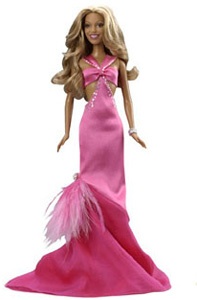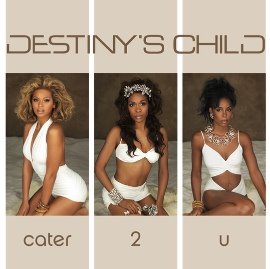Just Who Is This Beyoncé?

Think back to the year 2000, that far away time when, as it turned out, we didn't have flying cars like we were promised but did have Destiny's Child. And for a moment, it seemed like an even trade because surely with these four ladies, the future had arrived.
Or three ladies, eventually. Or eleven. Or whatever, really, because it didn't matter how many roster changes the group endured. Destiny's Child was really about one woman: Beyoncé (pronounced with an "on-say") Knowles. She was the next generation. The future of diva.
In 2000 Beyoncé was making herself known as a formidable and unusual artist. If reports are to be believed, she was writing her own material, and it was about what a fiercely unattached woman she was. Unlike many women in pop, Beyoncé released single after single about how she was independent, intelligent, and (most uniquely) self-defined without a man's approval.
(Before we go any further, let me acknowledge that I know a lot of Destiny's Child's music was created by men, just like their image. But sometimes that music and those images do escape the clutches of the people who create them and manage to have an honest resonance all their own. For the purposes of this investigation, I'm accepting that there is a cultural validity to the personas crafted for music stars, even if we can see some of the puppet strings on their wrists.)
TLC had laid the ground work for Beyoncé's brand of stuttering-beat liberation with hits like "Ain't 2 Proud 2 Beg" (a backhanded embrace of female sexuality), "What About Your Friends" (a reminder that your own best friend is probably yourself), and "No Scrubs" (a reminder that.... well, I'll get to that.) Salt 'n Pepa, En Vogue, and earlier acts like Aretha Franklin had also helped get things started, too.
And like the truly legendary among her predecessors, Beyoncé had the charisma and savvy to become a force of pop nature. People cared about her in that way that makes someone a star instead of just a popular recording artist. This is why we're not discussing Kelly Rowland or Michelle Williams: AKA, the Other Two. This is why they made a Beyoncé Barbie.

At first, Ms. Knowles seemed to be using her power to assert feminine authority. Take "Bills, Bills, Bills," which often gets lumped in with "No Scrubs" as a greed anthem of 1999. But in "No Scrubs" men are dropped for having no money, while in "Bills, Bills, Bills" Beyoncé cans them for not being able to pay the charges they run up on her credit card (listen to the lyrics, y'all!) She certainly doesn't need a leech like that in her life. Or a co-dependent bug-a-boo, as we'd learn later.
And then came the one-two punch of "Independent Women, Part 1" and "Survivor," in which the record company made a bigger deal of Ms. Knowles' songwriting contributions and how her message was that she didn't need some chump's money (the former) or fale friends (the latter).
And it was kind of awesome for a woman in pop to be so agressively self-sufficient. It was--dare I say it--awesome like how Madonna's awesome.
Then Beyoncé transformed into a man's plaything. I'm not saying I know how it happened--may she changed for real; mayber her handlers decided she was losing too many fans by not seeming sexually docile--but it happened all the same. Consider these lyrics from "Cater 2 U," the last official single from Destiny's Child, released in 2005 :
If you want it
Say the word

I know whatever I 'm not fulfilling
Another woman is willing
I'm going to fulfill your mind, body, and spirit
I promise
I'll keep myself up
Remain the same chick
You fell in love with
I'll keep it tight,
I'll keep my figure right.
I'll keep my hair fixed,
Keep rocking the hottest outfits.
When you come home late,
tap me on my shoulder, I'll roll over.
Baby I heard you; I'm here to serve you.
If it's love you need, to give it is my joy.
I'm here to cater to you boy.
Hardly an independent woman now, is she? Granted, that's the most blatantly passive verse in the song, and Kelly sings it. But Beyoncé's implicated in the message by singing back up. And that's only her singing on "Check On It," her number one single from earlier this year. There's a bit more confidence in the sexuality of the lyric, but she is still priding herself for being able to control men with her sexual allure instead of celebrating her free-thinking independence or insistence that she be "fifty-fity in relationships" (to quote "Independent Women, Part 1.")
Now her message is one of reliance on men and and/her power to make them want her.
So where did this Beyoncé come from? Why did she make such a shift in her public persona? Or was I just overlooking something that was always there? Did Beyoncé finally capitulate to to the pressure to be a sex toy, or was she presenting herself as one all along?
You tell me.
Labels: R+B / Hip-Hop

2 Comments:
You know, this may sound cynical and slightly oversimplified, but I think Beyonce prolly wants to pay her bills, bills, bills. For some reason, someone decided these were money-making songs, and for whatever reason, she didn't argue. Lyrical content in a lot (but not all) of pop music is background noise to the production and hot beats, so maybe she decided to forego verbal substance for the sexy allure of $$cashola$$.
Or maybe she was abducted by aliens and replaced with a robot-Beyonce, one comprised mainly of circuitry and a thick coating of Betty Crocker double-chocolate frosting.
Fair enough point, but Beyonce was already making money thong-over-fist with the Independent Woman era. In fact, those albums sold *more* than Destiny Fulfilled, and those singles were bigger hits. (At leat IWP1 was... It was number 1 for 11 weeks.)
So it doesn't seem like Beyonce needed to change her image in order to keep selling records. But she did. It frustrates me becuase I feel like it made her more generic.
Post a Comment
<< Home